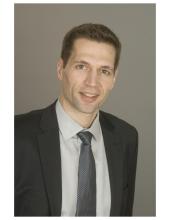Title:
Dr. Joel Dudley, Icahn School of Medicine at Mount Sinai
Year:
2014
Category:
Data to Decisions
Result:
Finalist

The Company:
Icahn School of Medicine at Mount Sinai is proud to stand as a leader in medical and scientific training, biomedical research, and patient care. Our unwavering dedication to intellectual exchange, multidisciplinary teamwork, and innovation propels us ever forward in discoveries and advances to improve the human condition. Working in close partnership with The Mount Sinai Hospital, the Icahn School of Medicine serves one of the most diverse and complex patient populations in the world. Our passion for patient-focused research and education has inspired generations of physicians and researchers to learn, teach and practice breakthrough translational medicine on our campus.
The Problem:
Icahn School of Medicine at Mount Sinai is proud to stand as a leader in medical and scientific training, biomedical research, and patient care. Our unwavering dedication to intellectual exchange, multidisciplinary teamwork, and innovation propels us ever forward in discoveries and advances to improve the human condition. Working in close partnership with The Mount Sinai Hospital, the Icahn School of Medicine serves one of the most diverse and complex patient populations in the world. Our passion for patient-focused research and education has inspired generations of physicians and researchers to learn, teach and practice breakthrough translational medicine on our campus.
The Solution:
Mount Sinai Hospital has one of the largest datasets in the world that pairs genetic data with clinical data. Joel Dudley, Ph.D., collaborated with Ayasdi to explore what insights could be found within it. He decided to start with Type 2 Diabetes—a pervasive, devastating, and highly complicated disease—and uploaded all of the Type 2 Diabetes data into Ayasdi’s platform. There was no need to formulate hypotheses or code queries beforehand. Instead, the platform relies on machine learning and Topological Data Analysis (TDA) to automatically find relevant relationships between data points. He simply let the data take shape, knowing that the shape would then lead him to insights. Starting out, he had no idea where the data would lead him or what insights he would find. Mount Sinai’s multi-model data set is not only massive, but also complex. It included 11,210 rows of patients, 198,053 columns of EMR data with full genomic sequencing. Columns included 197,378 genomic markers, and 500 clin
The Results:
Type 2 Diabetes is a disease that results from insulin resistance. Complications from this disease are numerous and can dramatically impact a patient’s quality of life and even be life threatening. Today, it is considered a singular disease and is often treated as such.
However, after looking at the shape of Mt. Sinai’s data generated by Ayasdi’s software, Dr. Joel Dudley and his team identified THREE distinct subtypes of Type 2 Diabetes patients with different and distinct set of complication types:
Kidney Disease/Fibrosis
Cardiovascular and Immune Disease
Lipid Dysfunction (Cholesterol, Atherosclerosis, etc.)
What this really means, according to Dr. Pek Lum, Chief Data Scientist and VP of Product at Ayasdi is that, “There is no such thing as Type 2 Diabetes as we know it. Maybe there’s Type 3, Type 4, Type 5, or more, based on these sub-groupings of patient populations.”
Metrics:
Saved Time: Mt. Sinai saved an immeasurable amount of time sifting through data. The breakthrough was discovered within hours of uploading the data into Ayasdi’s platform. A traditional query-driven approach can take a Data Scientist months, if not years, to finally arrive at a singular meaningful insight.
Paved Way for More Effective Treatment: The power of this insight is that, when properly diagnosed, we will be able to more accurately define which sub-group that a Type 2 Diabetes patients belong to—using the genetic markers and data features that we discovered—and then hopefully define treatment plans that work most effectively for that sub-population.
The Technology:
Mount Sinai utilized Ayasdi’s insight discovery platform—which uses machine learning and Topological Data Analysis (TDA)—to analyze over 20,000 patient medical records paired with genetic data.
Ayasdi’s approach is query-free, and can automatically map relevant data points based on hundreds of algorithms
Disruptive Factor:
Today, Type 2 Diabetes is considered a singular disease. Based on the data, perhaps there are not just three types, but 20 different types of Diabetes--each with common and distinct characteristics. When we more precisely diagnose this disease, patients can take better preventative measures, pharmaceutical companies can develop more targeted drugs, clinicians can prescribe more efficacious medications, hospital can reduce readmission rates, and patient outcomes will improve.
While there has already been some success analyzing cancer data, there are so many other diseases--including Type 2 Diabetes and heart disease--that can benefit from using Ayasdi’s platform. We are on the precipice of huge breakthroughs and Mount Sinai, in partnership with Ayasdi, will be leading the way.
Shining Moment:
What is really thrilling about this case study is that we have a new way of delivering personalized medicine and improving patient outcomes for Type 2 Diabetes patients. Utilizing Ayasdi, we have discovered there is no such thing as Type 2 Diabetes as we know it. There may even be Type 3, 4, 5 or more based on the sub-grouping of patient populations. These are ground breaking findings in the medical community.

